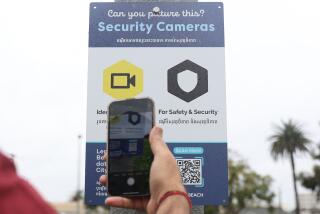A New Attack on Vice
After several false starts, the Los Angeles City Council is poised to begin battling the worldâs oldest profession with one of societyâs oldest weapons--shame.
Just print and broadcast the names and photos of men arrested for soliciting prostitutes, the argument goes, and johns will be so humiliated that they will go away and not come back--not to mention the deterrent effect on their brethren.
The plan, introduced by Councilman Hal Bernson and supported unanimously by the rest of the council, has been implemented in various forms in large and small cities nationwide.
But from Boston to tiny La Mesa in San Diego County, officials say that the program has had little measurable impact on prostitution.
The best that the city attorney of La Mesa could say is that âthereâs no evidence that it doesnât work.â The San Diego suburb pays a local paper to run ads featuring the names and photos of convicted solicitors.
In Long Beach, where the Press Telegram regularly publishes convicted johnsâ names as a free public service, arrests have remained at about the same levels, fluctuating mainly according to the size of the vice squad and the number of anti-prostitution sweeps that police are able to conduct, officials said.
Meanwhile, civil libertarians and the Los Angeles city attorney have warned that Bernsonâs plan leaves the city wide open for lawsuits, in part because the distributed names would include people accused but not convicted of solicitation.
âIt really turns the presumption of innocence on its head,â said Dan Tokaji of the American Civil Liberties Union in Los Angeles.
Despite these and other pitfalls, the idea of distributing the names of johns has been embraced by community groups. Police say it is part of a new wave of vice enforcement aimed at attacking the demand side of such crimes as prostitution.
In Cincinnati, residents of the crime-plagued Over-the-Rhine neighborhood have set up a similar program on their own. They obtain the names of convicted johns, which are a matter of public record, from local authorities. Then, with money raised in the community, they purchase newspaper ads to run the names.
But humiliation, detectives in several cities said, can go only so far. More effective, said Lt. Mike Hill of the Long Beach Police Department, is to increase sweeps of known red-light districts.
A recently passed state law that allows police to arrest prostitutes for loitering has become another important tool. Prostitution in two of Los Angelesâ hot spots--the Sepulveda Corridor in the San Fernando Valley and along Sunset Boulevard in Hollywood--is down this year, according to detectives and community leaders, who give much of the credit to the new loitering law.
Bernsonâs plan, as now envisioned, would involve photographing all of the men--and the occasional woman--arrested and booked for soliciting. The names, partial addresses and pictures of the suspects would be distributed to print and broadcast journalists, and shown on the cityâs cable TV station.
The councilman met Monday with LAPD officials for the first of what is likely to be a series of meetings. If problems can be worked out, the measure is likely to come up for a full council vote in the next several weeks, said Bernson aide Greg Smith.
The council approved the plan in concept in December, but still has to adopt a formal measure that would enable city employees to distribute the names. The names are already public record, available to citizens who wish to obtain them, but they can be difficult to gather and expensive to distribute.
The Los Angeles plan differs markedly from the programs in other cities, where the names are typically released of people once they are convicted. But Bernson argues that accused johns should be treated no differently than any other alleged criminal.
In a report to the City Council last month, City Atty. James K. Hahn wrote that the policy could open the city up to charges of libel if an innocent person were portrayed in a false light as a result of releasing the names. The practice could also be interpreted as an invasion of privacy, Hahn said.
*
In 1984, when then-City Atty. Ira Reiner tried to implement a similar policy, it was forbidden by a Superior Court judge who said that publishing the addresses violated the privacy rights of suspects. And without the addresses, the court said, an innocent person bearing the same name as a suspect might be unfairly humiliated.
In Long Beach and Boston, vice detectives say that not a single repeat offender has been arrested since their programs were implemented about two years ago.
But that may not be a good gauge of success. Los Angeles Police Sgt. Alicia Wolan, who heads vice operations at the Van Nuys Division, said it is highly unusual for the same person to be picked up twice for soliciting a prostitute, whether the names are released to the press or not.
More to Read
Sign up for Essential California
The most important California stories and recommendations in your inbox every morning.
You may occasionally receive promotional content from the Los Angeles Times.










